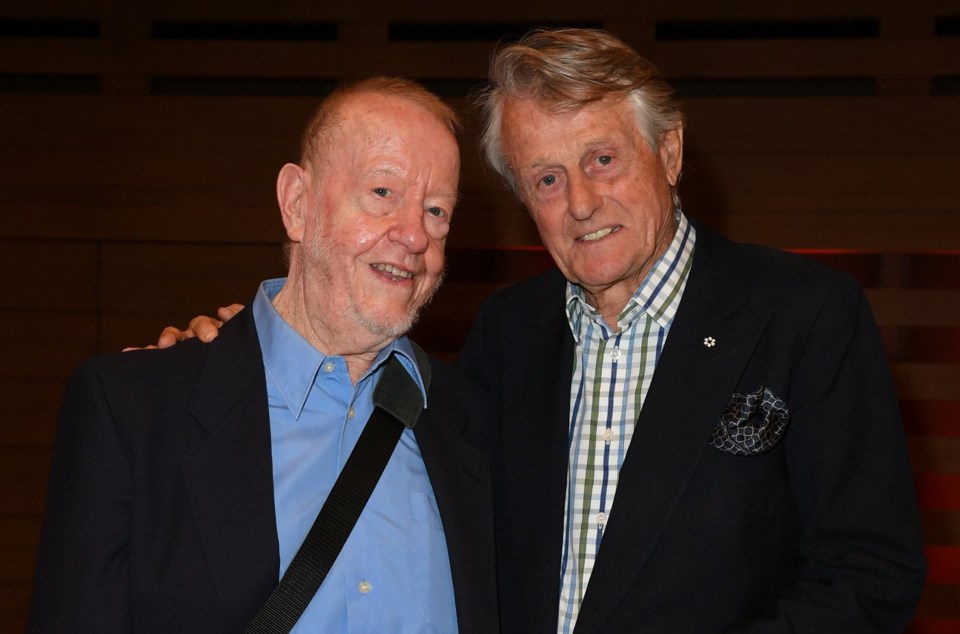TORONTO — Canadian poet-translator George McWhirter stood alone at a lectern Wednesday night to accept the Griffin Poetry Prize he earned with his friend and longtime collaborator Homero Aridjis.
The prodigious Mexican poet couldn't attend the ceremony in Toronto where his collection, "Self-Portrait in the Zone of Silence," won the $130,000 award because he was recovering from intestinal surgery.
"I'm so sorry he is not here to accept the prize for his work, which is expansive," McWhirter said in his acceptance speech. "It covers everything that you could think of in Mexico. It covers the people, the politics, the history and the dreams and the myths. And it all floats through his poetry."
Jurors praised the collection, which uses mythical imagery to examine emotional realities, for presenting "a rounded human being engaged with our total experience."
McWhirter, who formerly headed up the creative writing department at the University of British Columbia, has been translating Aridjis's work since 1987. But his translation of poetry goes back as far as his writing does, he said.
"Even when I was in high school, I started when I was just 16," McWhirter said in a brief interview after the ceremony. "I learned to write poetry by translating poetry."
The Griffin gives 60 per cent of the prize winnings to the translator and 40 per cent to the original poet, in recognition of the art of poetry in translation.
With Aridjis, McWhirter said, the translation process is collaborative -- and not just between the two of them.
Aridjis's wife, Betty Ferber, is the third pillar of their team.
"She is the great second-guesser, and she is rigorous, and a great proofreader," McWhirter said in his speech.
While Aridjis speaks English, McWhirter said it "doesn't reach as far" as his Spanish.
"Homero is many poets in one," McWhirter said earlier in the night. "He writes about many Mexicos and many Mexicans."
Aridjis is president emeritus of PEN International, a writers association, and also served as Mexico's ambassador to Switzerland, the Netherlands and UNESCO.
The runners-up are "A Crash Course in Molotov Cocktails," translated by Amelia Glaser of the United States and Yuliya Ilchuk of Ukraine, from the original Ukrainian by Halyna Kruk; U.S. poet Jorie Graham for "To 2040"; Ann Lauterbach of the United States for "Door"; and Ishion Hutchinson of Jamaica for "School of Instructions."
Runners-up receive $10,000, with 40 per cent going to the original writer and 60 per cent to the translators.
Until recently, the Griffin handed out separate awards for international and Canadian poets, but prize benefactor Scott Griffin announced in 2022 that the award would consolidate the categories — which were worth $65,000 apiece — into one global purse for the best book of poetry published or translated into English.
Last year's winner was U.S. poet Roger Reeves, for his book "Best Barbarian."
McWhirter is the first Canadian to win since the change.
Wednesday night's festivities also included a reading by Maggie Burton, who won this year's Canadian First Book Prize for her debut collection, "Chores," which she said took 10 years to write.
A St. John's, N.L., city councillor, violinist, mom of four and poet, Burton is a somewhat unconventional multihyphenate. It's difficult, she said, to balance the obligations of daily life with her creative process, which is a recurring theme in her collection.
"I'm so happy any time someone says the poems resonate with them," she said in an interview ahead of the readings.
"Anyone who experiences tension between various opposing ideals that are listed in my book ... it's really meaningful when people can respond to it in that way. That makes it all worth it."
An attentive audience of poetry lovers and publishing industry insiders packed into Toronto's Koerner Hall for the readings, which were punctuated by laughter and applause.
"It is wonderful to see so many human beings wanting to listen to poetry in this desperately unpoetic time," Lauterbach, one of the runners-up, said ahead of her reading.
Those human beings were rapt as Newfoundland-based poet Don McKay received the $25,000 Lifetime Recognition Award.
He won the Griffin Poetry Prize in 2007 for "Strike/Slip," a work jurors at the time praised as "a playful yet resonant microcosm, charted with virtuosity and love."
He was a finalist for the prize two other times, and has twice won the Governor General’s Literary Award for Poetry.
"Thank you so much," he said as he accepted the award. "I'm deeply moved. Nevertheless, I'm going to read an essay."
That reading garnered a standing ovation.
This report by The Canadian Press was first published June 5, 2024.
Nicole Thompson, The Canadian Press



